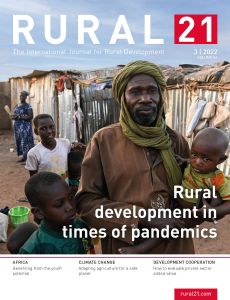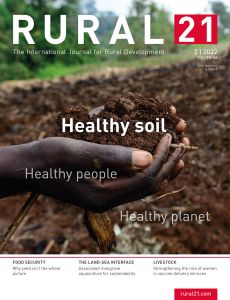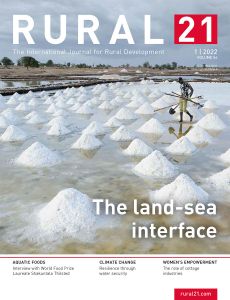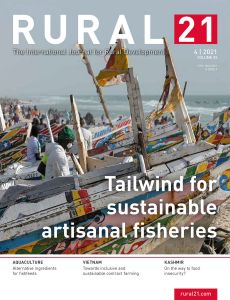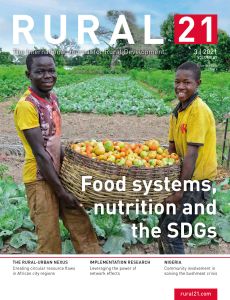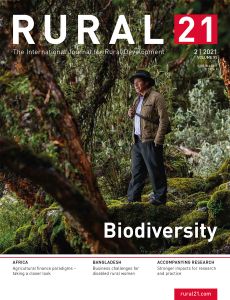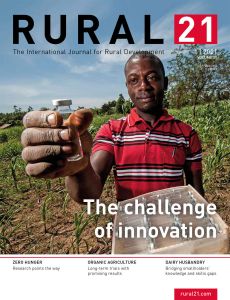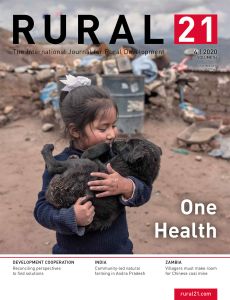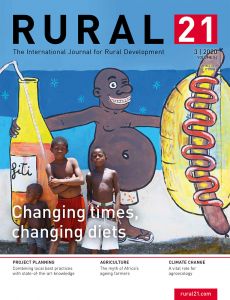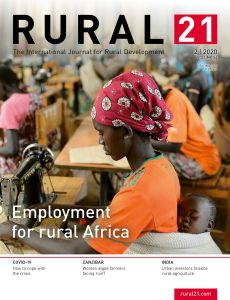Rural 21 (Englische Ausgabe)
-
Rural 21 (engl. Ausgabe 3/2022)
Focus 3/2022: Rural development in times of pandemics
For merely three years, the corona pandemic has held sway of our lives, with what are now more than 6.5 million deaths reported globally and millions of people who have fallen into poverty. Following the outbreak of the pandemic, the global economy fell into its deepest recession since World War II. Over 90 per cent of economies saw their gross domestic product fall, by a global average of 3.3 per cent in 2020.
Extensive macroeconomic relief measures helped the world economy to achieve a slight recovery in 2021. However, this positive trend has again been nullified by the impact of the Russian invasion of Ukraine. The World Bank estimates that global growth, still at 5.7 per cent in 2021, will have dropped to 2.9 per cent by the end of the year.
Even though we are not yet able to assess the long-term impacts of the pandemic today, insights so far paint a rather sobering picture. Existing social and economic inequalities have become further aggravated, and the world’s goal of ending hunger and poverty is getting further and further out of reach.
Erfahren Sie mehr -
Rural 21 (engl. Ausgabe 2/2022)
Focus 2/2022: Healthy soil – healthy people – healthy planet
We cannot live without healthy soil and land. It is on these resources that we produce most of our food and build our homes. We need them to provide clean water and precious plant nutrients, to conserve biological diversity and to cope with climate change. And they form the basis for the livelihoods of millions of people. But despite such known facts, these valuable resources are in a dire state. A third of all soils world-wide are already degraded, and each year, further huge expanses of fertile land go lost.
We know that the only way to reverse this trend is with a paradigm shift – away from a resource-intensive mode of production and towards a resource-friendly mode considering the planetary boundaries while placing our global agricultural and food systems on sustainable foundations. Our authors and interview partners share examples of global and national initiatives and policies as well as research insights and practical examples addressing this topic with you.
Erfahren Sie mehr -
Rural 21 (engl. Ausgabe 1/2022)
Focus 1/2022: Land-sea interactions
The increase in anthropogenic activities at the interface between land and sea is having a severe impact on coastal ecosystems and their services. And this is also affecting the livelihoods of coastal communities, which are already especially hard-hit by the effects of climate change. It is all the more important to find governance structures that consider the interdependencies between land and sea and allow proper management of possible externalities.
Erfahren Sie mehr -
Rural 21 (engl. Ausgabe 4/2021)
Focus 2/2021: Tailwind for sustainable artisanal fisheries
In mid-June 2021 the UN Decade on Ecosystem Restoration was officially launched by the UN General Assembly. It follows the UN Decade on Biodiversity, which closed with the sobering assessment that none of the targets which the international community had set itself on world-wide conservation of biodiversity, the so-called Aichi Targets, had been fully achieved. On the contrary, never before has species extinction progressed as rapidly as during the last 100 years. And this is happening despite our all being fully aware that biological diversity and its related ecosystem services – such as food, clean water, clean air and natural ingredients of medicines, to name just a few – are essential for the survival of humankind.
When the UN Decade on Ecosystem Restoration draws to a close, we will also have reached the target year of Agenda 2030, the year by which the Sustainable Development Goals (SDGs) ought to have been achieved. All of us know that the majority of these Goals cannot be reached if the current pace of biological extinction is not slowed down. And since the corona pandemic at the latest, it has become unambiguously clear just how closely the well-being of humans and that of nature are linked. So it is high time for us to rethink and completely revise our relationship with nature.
One opportunity for this comes up this year’s October, when the international community gathers in Kunming, China, at the 15th Conference of the Parties of the UN Convention on Biological Diversity (COP15) to negotiate a new global biodiversity framework. What do we expect from these talks? We couldn’t put it better than Christian Schwarzer, Founding Member of the Global Youth Biodiversity Network, who said at the recent European Development Days: “I want you to fight for biodiversity as if the life of your beloved family were at stake.”
Erfahren Sie mehr -
Rural 21 (engl. Ausgabe 3/2021)
Focus 2/2021: Food systems, nutrition and the SDGs
In mid-June 2021 the UN Decade on Ecosystem Restoration was officially launched by the UN General Assembly. It follows the UN Decade on Biodiversity, which closed with the sobering assessment that none of the targets which the international community had set itself on world-wide conservation of biodiversity, the so-called Aichi Targets, had been fully achieved. On the contrary, never before has species extinction progressed as rapidly as during the last 100 years. And this is happening despite our all being fully aware that biological diversity and its related ecosystem services – such as food, clean water, clean air and natural ingredients of medicines, to name just a few – are essential for the survival of humankind.
When the UN Decade on Ecosystem Restoration draws to a close, we will also have reached the target year of Agenda 2030, the year by which the Sustainable Development Goals (SDGs) ought to have been achieved. All of us know that the majority of these Goals cannot be reached if the current pace of biological extinction is not slowed down. And since the corona pandemic at the latest, it has become unambiguously clear just how closely the well-being of humans and that of nature are linked. So it is high time for us to rethink and completely revise our relationship with nature.
One opportunity for this comes up this year’s October, when the international community gathers in Kunming, China, at the 15th Conference of the Parties of the UN Convention on Biological Diversity (COP15) to negotiate a new global biodiversity framework. What do we expect from these talks? We couldn’t put it better than Christian Schwarzer, Founding Member of the Global Youth Biodiversity Network, who said at the recent European Development Days: “I want you to fight for biodiversity as if the life of your beloved family were at stake.”
Erfahren Sie mehr -
Rural 21 (engl. Ausgabe 2/2021)
Focus 2/2021: Biodiversity
In mid-June 2021 the UN Decade on Ecosystem Restoration was officially launched by the UN General Assembly. It follows the UN Decade on Biodiversity, which closed with the sobering assessment that none of the targets which the international community had set itself on world-wide conservation of biodiversity, the so-called Aichi Targets, had been fully achieved. On the contrary, never before has species extinction progressed as rapidly as during the last 100 years. And this is happening despite our all being fully aware that biological diversity and its related ecosystem services – such as food, clean water, clean air and natural ingredients of medicines, to name just a few – are essential for the survival of humankind.
When the UN Decade on Ecosystem Restoration draws to a close, we will also have reached the target year of Agenda 2030, the year by which the Sustainable Development Goals (SDGs) ought to have been achieved. All of us know that the majority of these Goals cannot be reached if the current pace of biological extinction is not slowed down. And since the corona pandemic at the latest, it has become unambiguously clear just how closely the well-being of humans and that of nature are linked. So it is high time for us to rethink and completely revise our relationship with nature.
One opportunity for this comes up this year’s October, when the international community gathers in Kunming, China, at the 15th Conference of the Parties of the UN Convention on Biological Diversity (COP15) to negotiate a new global biodiversity framework. What do we expect from these talks? We couldn’t put it better than Christian Schwarzer, Founding Member of the Global Youth Biodiversity Network, who said at the recent European Development Days: “I want you to fight for biodiversity as if the life of your beloved family were at stake.”
Erfahren Sie mehr -
Rural 21 (engl. Ausgabe 1/2021)
Focus 1/2021: The challenge of innovation
“Innovate or die” is a known mantra in the business world. It has already accompanied generations of entrepreneurs, reminding them that if they seek to survive on the market in the long run, “business as usual” cannot be an option. The stakeholders in development cooperation, too, have long been aware that resorting to tried and tested insights and methods simply isn’t enough when it comes to coping with global challenges such as climate change and biodiversity loss, depletion of natural resources and a growing number of conflicts – including newly emerging epidemics.
Meanwhile, there is far-reaching agreement that progress in development in the rural regions of our world not being at the level desired cannot be put down to a lack of new knowledge. Rather, the problem is that of implementing this knowledge and hence the question of how new ideas get “from the lab to the field”, how innovative solutions can be taken to scale, and quickly at that, for there is no time to lose.
Erfahren Sie mehr -
Rural 21 (engl. Ausgabe 4/2020)
Focus 4/2020: One Health
Against the backdrop of current developments surrounding COVID-19, the “One Health” approach is gaining momentum. It is based on the insight that zoonoses, i.e. diseases that can be transmitted from animals to humans, can be predicted, prevented and controlled much more quickly and at a lesser cost than if the two disciplines are working separately. But the One Health concept also implies that human and animal health are intrinsically linked to the health of our environment. In other words, it is a comprehensive approach that reaches way beyond tackling infectious diseases.
Erfahren Sie mehr -
Rural 21 (engl. Ausgabe 3/2020)
Focus 3/2020: Changing times, changing diets
In its 2019 publication Food in the Anthropocene, the EAT-Lancet Commission described the link between nutritional targets and environmental sustainability. In brief, the study argues that diets and food production will need to change in order to improve health and avoid damage to the planet, emphasising that people will have to eat more fruit, vegetables, nuts and seeds, legumes and whole grains while reducing the consumption of ruminant meat in particular. Setting out from this, the authors presented a proposition for a global reference diet. Whereas it is undisputed that the recommendations of the Lancet Commission point in the right direction, the question remains how the world population can be urged to take precisely this course.
Erfahren Sie mehr -
Rural 21 (engl. Ausgabe 2/2020)
Focus 2/2020: Employment for rural Africa
Many people in the Global South have no option to earn an income enabling them a life beyond poverty, not to mention a decent living. The situation is particularly volatile in Africa, for the population there will double by 2050, and every year, 25 million new jobs need to be created for the surge of young people entering the labour market. These young people are more educated, more entrepreneurial, more savvy and more technical-skilled than any other generation before them. So this is a huge potential that can be put to use – provided that the existing hurdles can be cleared, and that the impacts of the corona crisis can be contained as quickly as possible.
Erfahren Sie mehr

